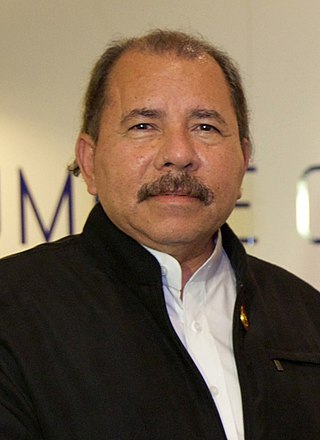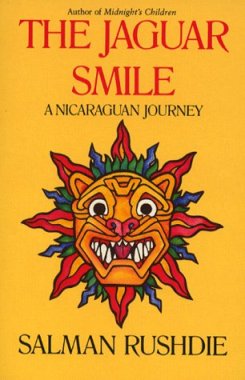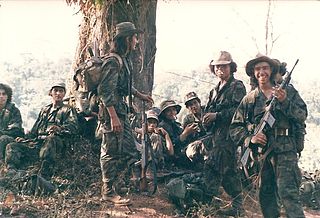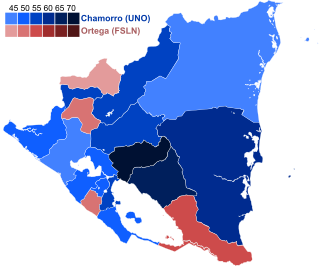
The Contras were the various U.S.-backed-and-funded right-wing rebel groups that were active from 1979 to 1990 in opposition to the Marxist Sandinista Junta of National Reconstruction Government in Nicaragua, which had come to power in 1979 following the Nicaraguan Revolution. Among the separate contra groups, the Nicaraguan Democratic Force (FDN) emerged as the largest by far. In 1987, virtually all Contra organizations were united, at least nominally, into the Nicaraguan Resistance.

José Daniel Ortega Saavedra is a Nicaraguan politician who has served as the 58th president of Nicaragua since 2007. Previously he was leader of Nicaragua from 1979 to 1990, first as Coordinator of the Junta of National Reconstruction from 1979 to 1985, and then as the 54th President from 1985 to 1990. During his first term, he implemented policies to achieve leftist reforms across Nicaragua. In later years, Ortega's left-wing radical politics cooled significantly, leading him to pursue pro-business policies and even rapprochement with the Catholic Church. However, in 2022, Ortega resumed repression of the Church, and has imprisoned prelate Rolando José Álvarez Lagos.
Moral equivalence is a term used in political debate, usually to deny that a moral comparison can be made of two sides in a conflict, or in the actions or tactics of two sides.
Nicaragua is a nation in Central America. It is located about midway between Mexico and Colombia, bordered by Honduras to the north and Costa Rica to the south. Nicaragua ranges from the Caribbean Sea on the nation's east coast, and the Pacific Ocean bordering the west. Nicaragua also possesses a series of islands and cays located in the Caribbean Sea.

The Republic of Nicaragua v. The United States of America (1986) was a case where the International Court of Justice (ICJ) held that the U.S. had violated international law by supporting the Contras in their rebellion against the Sandinistas and by mining Nicaragua's harbors. The case was decided in favor of Nicaragua and against the United States with the awarding of reparations to Nicaragua.

The Sandinista National Liberation Front is a left-wing political party in Nicaragua. Its members are called Sandinistas in both English and Spanish. The party is named after Augusto César Sandino, who led the Nicaraguan resistance against the United States occupation of Nicaragua in the 1930s.

The Reagan Doctrine was stated by United States President Ronald Reagan in his State of the Union address on February 6, 1985: "We must not break faith with those who are risking their lives—on every continent from Afghanistan to Nicaragua—to defy Soviet-supported aggression and secure rights which have been ours from birth." It was a strategy implemented by the Reagan Administration to overwhelm the global influence of the Soviet Union in the late Cold War. The doctrine was a centerpiece of United States foreign policy from the early 1980s until the end of the Cold War in 1991.
The Boland Amendment is a term describing two U.S. legislative amendments between 1982 and 1984, both aimed at limiting U.S. government assistance to the Contras in Nicaragua. The first Boland Amendment was part of the House Appropriations Bill of 1982, which was attached as a rider to the Defense Appropriations Act of 1983, named for the Massachusetts Democrat, Representative Edward Boland, who authored it. The House of Representatives passed the Defense Appropriations Act 411–0 on December 8, 1982, and it was signed by President Ronald Reagan on December 21, 1982. The amendment outlawed U.S. assistance to the Contras for the purpose of overthrowing the communist Nicaraguan government, while allowing assistance for other purposes.

Violeta Barrios Torres de Chamorro is a Nicaraguan former politician who served as the 55th President of Nicaragua from 1990 to 1997. She was the first and, to date, only woman to hold the position of president of Nicaragua. Previously, she was a member of the Junta of National Reconstruction from 1979 to 1980.

The Nicaraguan Revolution encompassed the rising opposition to the Somoza dictatorship in the 1960s and 1970s, the campaign led by the Sandinista National Liberation Front (FSLN) to oust the dictatorship in 1978–79, the subsequent efforts of the FSLN to govern Nicaragua from 1979 to 1990, and the Contra War, which was waged between the FSLN-led government of Nicaragua and the United States–backed Contras from 1981 to 1990. The revolution marked a significant period in the history of Nicaragua and revealed the country as one of the major proxy war battlegrounds of the Cold War, attracting much international attention.
American foreign policy during the presidency of Ronald Reagan (1981–1989) focused heavily on the Cold War which shifted from détente to confrontation. The Reagan Administration pursued a policy of containment and rollback with regards to communist regimes. The Reagan Doctrine operationalized these goals as the United States offered financial, logistical, training, and military equipment to anti-communist opposition in Afghanistan, Angola, and Nicaragua. He expanded support to anti-communist movements in Central and Eastern Europe.
Operation Charly, was allegedly the code-name given to a program during the 1970s and 1980s undertaken by the junta in Argentina with the objective of providing military and counterinsurgency assistance to right-wing dictatorships and insurgents in Central America. According to Noam Chomsky, the operation was either headed by the Argentine military with the agreement of the United States Department of Defense, or was led by the US and used the Argentinians as a proxy.

The Jaguar Smile is Salman Rushdie's first full-length non-fiction book, which he wrote in 1987 after visiting Nicaragua. The book is subtitled A Nicaraguan Journey and relates his travel experiences, the people he met as well as views on the political situation then facing the country. The book was written during a break the author took from writing his controversial novel The Satanic Verses.

Friendly bilateral relations now exist between Nicaragua and the United States. However, in the 19th and 20th centuries, tensions were high and American intervention was frequent. In the 1980s, due to Red Scare paranoia and an attempt to put down socialism in the region, the U.S proceeded to wage an undeclared war against the left-wing Sandinista movement by funding the Contra groups until it was defeated in the election in 1990.

CIA activities in Nicaragua were frequent in the late 20th century. The increasing influence gained by the Sandinista National Liberation Front, a left-wing and anti-imperialist political party in Nicaragua, led to a sharp decrease in Nicaragua–United States relations, particularly after the Nicaraguan Revolution. In 1981, President Ronald Reagan authorized the Central Intelligence Agency to support the Contras, a right-wing Nicaraguan political group to combat the influence held by the Sandinistas in the Nicaraguan government. Various anti-government rebels in Nicaragua were organized into the Nicaraguan Democratic Force, the first Contra group, at the behest of the CIA. The CIA also supplied the Contras with training and equipment, including materials related to torture and assassination. There have also been allegations that the CIA engaged in drug trafficking in Nicaragua.

General elections were held in Nicaragua on 25 February 1990 to elect the President and the members of the National Assembly. The result was a victory for the National Opposition Union (UNO), whose presidential candidate Violeta Chamorro surprisingly defeated incumbent president Daniel Ortega of the Sandinista National Liberation Front (FSLN). This led to a historic peaceful and democratic transfer of power in Nicaragua.

General elections were held in Nicaragua on 4 November 1984, to elect a president and parliament. Approximately 1.2 million Nicaraguans voted, representing a 75% turnout, with 94% of eligible voters registered. Impartial observers from international groupings such as the European Economic Community, religious groups sent to monitor the election, and observers from democratic nations such as Canada and Ireland concluded that the elections were generally free and fair.
In 1979, the Sandinista National Liberation Front (FSLN) overthrew Anastasio Somoza Debayle, ending the Somoza dynasty, and established a revolutionary government in Nicaragua. Following their seizure of power, the Sandinistas ruled the country first as part of a Junta of National Reconstruction. Following the resignation of centrist members from this Junta, the FSLN took exclusive power in March 1981.
In the U.S. political history of the 1980s, the Gang of Four refers to Bernard W. Aronson, Bruce P. Cameron, Robert S. Leiken, and Penn Kemble, four advocates of U.S. Congressional funding for the Nicaraguan Contras, who were engaged in an armed campaign in opposition to the Sandinista government, during the Reagan presidency. The four were prominent policy analysts and activists in the U.S. Democratic Party.
The United States has at various times in recent history provided support to terrorist and paramilitary organizations around the world. It has also provided assistance to numerous authoritarian regimes that have used state terrorism as a tool of repression.












